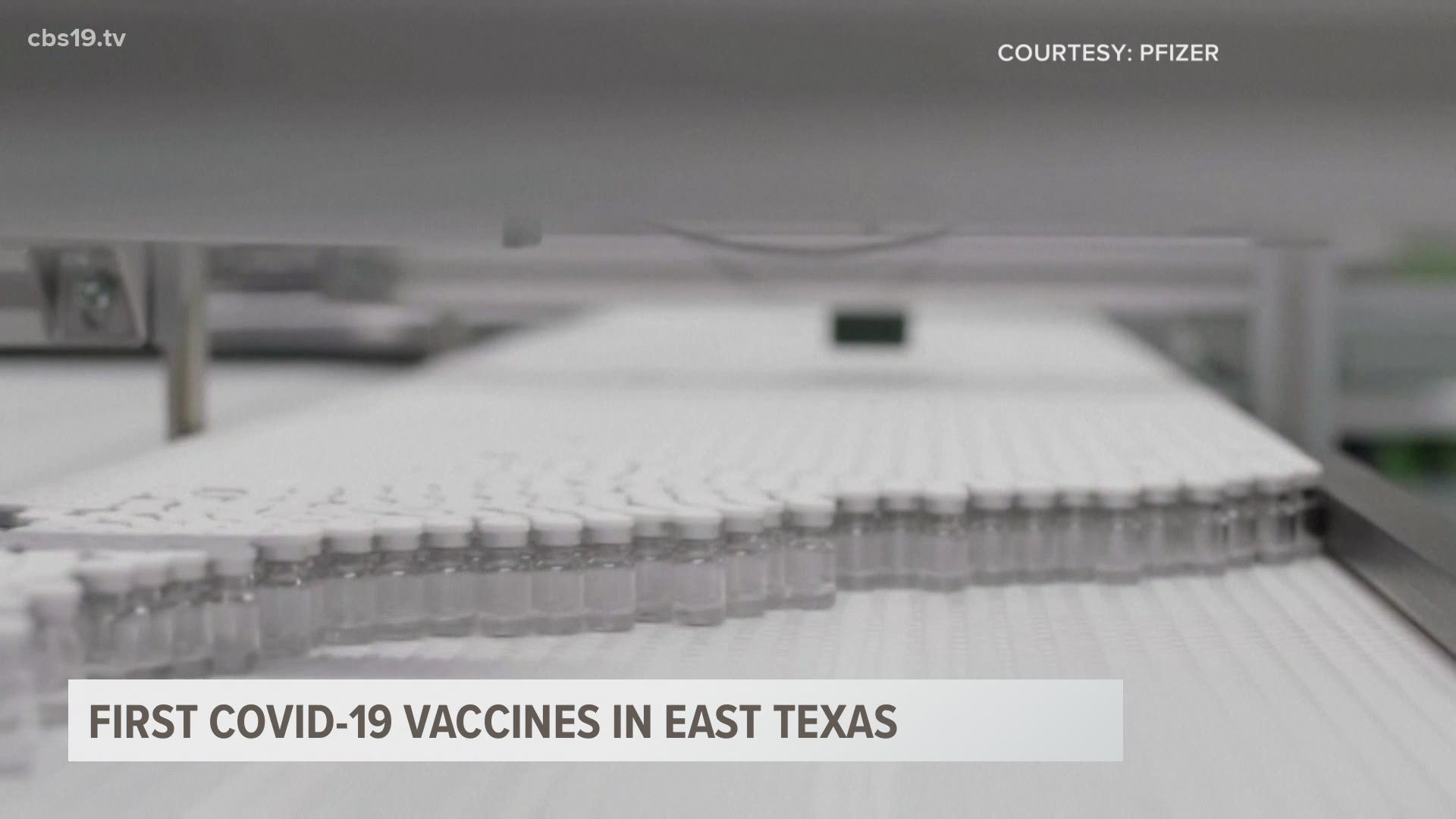TYLER, Texas — **EDITOR'S NOTE: The video above is from a story on Dec. 15, 2020, when the COVID-19 vaccine first arrived in East Texas.
The new COVID-19 vaccination will help protect you from getting COVID-19, according to the Centers for Disease Control and Prevention (CDC).
The CDC says you may have some side effects, which are normal signs your body is building protection. These side effects may affect your ability to do daily activities, but they should go away in a few days.
COMMON SIDE EFFECTS
- Pain on the arm you got the shot
- Swelling in the area where you got the shot
- Fever
- Chills
- Tiredness
- Headache
If you have pain or discomfort, talk to your doctor about taking an over-the-counter medicine, such as ibuprofen or acetaminophen.
To reduce pain and discomfort where you got the shot:
- Apply a clean, cool, wet washcloth over the area.
- Use or exercise your arm.
To reduce discomfort from fever:
- Drink plenty of fluids.
- Dress lightly.
WHEN TO CALL THE DOCTOR
In most cases, discomfort from fever or pain is normal. Contact your doctor or healthcare provider:
- If the redness or tenderness where you got the shot increases after 24 hours
- If your side effects are worrying you or do not seem to be going away after a few days
REMEMBER
- Side effects may feel like flu and even affect your ability to do daily activities, but they should go away in a few days.
- With most COVID-19 vaccines, you will need two shots in order for them to work. Get the second shot even if you have side effects after the first shot, unless a vaccination provider or your doctor tells you not to get a second shot.
- It takes time for your body to build protection after any vaccination. COVID-19 vaccines that require two shots may not protect you until a week or two after your second shot.
It’s important for everyone to continue using all the tools available to help stop this pandemic as we learn more about how COVID-19 vaccines work in real-world conditions. Cover your mouth and nose with a mask when around others, stay at least 6 feet away from others, avoid crowds, and wash your hands often.
ADDITIONAL INFORMATION FROM THE CDC
FACT: COVID-19 vaccines will not give you COVID-19
None of the COVID-19 vaccines approved or currently in development in the United States use the live virus that causes COVID-19. The goal for each of them is to teach our immune systems how to recognize and fight the virus that causes COVID-19. Sometimes this process can cause symptoms, such as fever.
It typically takes a few weeks for the body to build immunity after vaccination. That means it’s possible a person could be infected with the virus that causes COVID-19 just before or just after vaccination and get sick. This is because the vaccine has not had enough time to provide protection.
FACT: COVID-19 vaccines will not cause you to test positive on COVID-19 viral tests
Vaccines that have been approved or are currently in clinical trials in the United States won’t cause you to test positive on viral tests, which are used to see if you have a current infection.
If your body develops an immune response, which is the goal of vaccination, there is a possibility you may test positive on some antibody tests. Antibody tests indicate you had a previous infection and that you may have some level of protection against the virus. Experts are currently looking at how COVID-19 vaccination may affect antibody testing results.
FACT: People who have gotten sick with COVID-19 may still benefit from getting vaccinated
Due to the severe health risks associated with COVID-19 and the fact re-infection with COVID-19 is possible, people may be advised to get a COVID-19 vaccine even if they have been sick with COVID-19 before.
At this time, experts do not know how long someone is protected from getting sick again after recovering from COVID-19. The immunity someone gains from having an infection, called natural immunity, varies from person to person. Some early evidence suggests natural immunity may not last very long.
We won’t know how long immunity produced by vaccination lasts until we have a vaccine and more data on how well it works.
Both natural immunity and vaccine-induced immunity are important aspects of COVID-19 that experts are trying to learn more about, and CDC will keep the public informed as new evidence becomes available.
FACT: Getting vaccinated can help prevent getting sick with COVID-19
While many people with COVID-19 have only a mild illness, others may get a severe illness or they may even die. There is no way to know how COVID-19 will affect you, even if you are not at increased risk of severe complications. If you get sick, you also may spread the disease to friends, family and others around you while you are sick. COVID-19 vaccination helps protect you by creating an antibody response without having to experience sickness.
FACT: Receiving an mRNA vaccine will not alter your DNA
mRNA stands for messenger ribonucleic acid and can most easily be described as instructions for how to make a protein or even just a piece of a protein. mRNA is not able to alter or modify a person’s genetic makeup (DNA). The mRNA from a COVID-19 vaccine never enter the nucleus of the cell, which is where our DNA are kept. This means the mRNA does not affect or interact with our DNA in any way. Instead, COVID-19 vaccines that use mRNA work with the body’s natural defenses to safely develop protection (immunity) to disease.
RELATED: HOPE: UT Health Science Center at Tyler receives East Texas' first batch of COVID-19 vaccines

